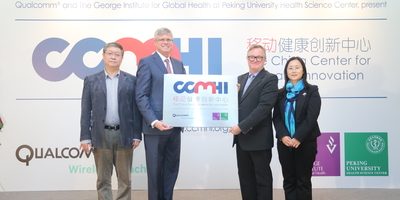
New smartphone-based study to provide healthier food choices for China’s consumers
Focusing on improving community health care in China through affordable, sustainable mobile health (mHealth) technology, the Beijing based China Center for mHealth Innovation (CCmHI) is now collaborating with China’s Center for Disease Control (China CDC) on a new approach to enable Chinese consumers to make healthier food choices.
Established in 2014 and hosted at The George Institute, China, CCmHI is positioned to become a world-class center for mHealth innovation. Currently, CCmHI’s first new study has started with collecting food labeling and packaging data nationwide, that will eventually be the foundation for a new, free smartphone tool available to Chinese consumers this July called FoodSwitch. This new phone app will provide users with a traffic light system on key nutrients by product that allows comparison to similar items to encourage a healthier choice.
“China’s rapid economic and social development means a dramatic increase in the consumption of packaged foods,” said Associate Professor Puhong ZHANG, Acting Director of CCmHI and Program Head at The George Institute, China, when explaining why FoodSwitch was chosen as the first CCmHI study. “Although there are relevant policies and regulations about food labeling in China, the understanding of its usage among people is still inadequate and there is an urgent need for awareness-raising and a more standardized and systematic way to support the monitoring of the packaged food environment in China.”
Already available and popular in Australia, New Zealand and the United Kingdom, FoodSwitch is a smartphone app designed by The George Institute for Global Health to jointly support the individual and environmental approaches to the prevention of diet-related ill health. FoodSwitch empowers consumers to make healthier food choices by providing them with convenient, easy to understand nutrition information. By crowd-sourcing food data across tens of thousands of food items, researchers, policy makers and manufacturers will have the information necessary to change the food environment.
FoodSwitch is a platform that delivers on one of CCmHI’s priorities, which is to target the 10 leading causes of premature death and disability in China, while supporting the development and expanded use of mHealth technologies.
“FoodSwitch is an excellent example of how large-scale access to advanced communications technologies can provide unprecedented support for public health policy in China,” said Steve Mollenkopf, chief executive officer of Qualcomm Incorporated, founding party of CCmHI.
“From the healthcare point of view, there are still lots of things that need to be done to address this public health problem which affects many of us in China.” Professor ZHANG continued. “Imagine you are at a local supermarket overwhelmed by hundreds of brand choices of packaged food. The foods often contain high-levels of salt, sugar and saturated fat, which may contribute to the risks of heart disease and stroke. How can you be sure you make the best choices and buy healthier food for you and your family? ”
FoodSwitch has been one of the most popular health apps in Australia, and is expected to be tailored to benefit the people in China. “It will be the first attempt to investigate and standardize the coordination of packaged food information in China and empower people with access to this information via mobile technology to make their own decisions about what to buy and what to eat,” said Professor ZHANG. “We are excited to carry out this study and hope that the results can inform government policies and bring real impact.”
Professor ZHANG indicated that CCmHI would collaborate with the CDC to first start collecting as much of the data as possible to build up the database of China’s packaged food products. This work is expected to be finished before July 2015. “We plan to officially launch the app in China in July, providing better food choices to Chinese consumers who will continuously contribute to the database by scanning and uploading the food information,” added Professor ZHANG.
The government work report delivered at the China’s National People's Congress identifies health as one of the critical basic needs for the population, and recommends that the government aim to constantly improve capacity of medical service delivery. Enhancing the capacity to prevent and treat major chronic diseases, many of which are tied to diet, has been identified as a priority of the government.
“China is in a transition period where Chinese people’s diets, nutrition, and health status are changing significantly.” Said Professor Bing ZHANG, Director of Department of Public Health Nutrition and Nutrition Policy, China CDC, “In order to more fully understand this transition, we have initiated a mass cohort study covering 15 provinces. This study, based on the long-term nationwide health and nutrition survey, is the only long-term cohort study of its kind focusing on nutrition and chronic diseases in China. ”
Professor Bing ZHANG continued, “The FoodSwitch mobile solution will be one of the tools to conduct the study. Findings from this study will provide the basis for instituting policy measures to manage chronic diseases in China. ”
About CCmHI:
China Center for mHealth Innovation (CCmHI) is hosted by The George Institute for Global Health at Peking University Health Science Center and funded by Qualcomm Incorporated, through its Qualcomm® Wireless Reach™ initiative. CCmHI is positioned to become a world-class center for mobile health (mHealth) innovation. Working with central and provincial governments, CCmHI will help improve community healthcare in China by developing mHealth solutions, implementing clinical evaluations and contributing to strategies for the implementation and scale-up of effective and affordable mHealth tools. By helping the Chinese people make better dietary decisions, FoodSwitch is a platform that delivers on one of CCmHI’s priorities, which is to target the target the 10 leading causes of premature death and disability in China, and to support the development and expanded use of mHealth technologies.
For more information please visit www.ccmhi.org.cn



